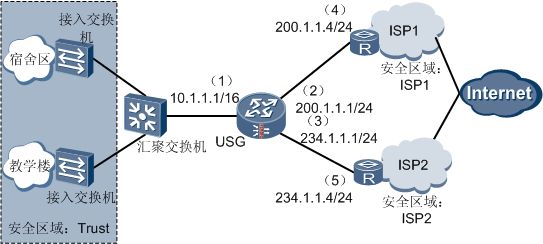出口网关双链路接入不同运营商举例(负载分担)
USG作为校园或大型企业出口网关可以实现内网用户通过两个运营商访问Internet,并保护内网不受网络攻击。
组网需求某学校网络通过USG连接到Internet,校内组网情况如下:
-
校内用户主要分布在教学楼和宿舍区,通过汇聚交换机连接到USG。
-
学校分别通过两个不同运营商(ISP1和ISP2)连接到Internet,两个运营商分别为该校分配了4个IP地址。ISP1分配的IP地址是200.1.1.1~200.1.1.4,ISP2分配的IP地址是234.1.1.1~234.1.1.4,掩码均为24位。
该学校网络需要实现以下需求:
- 校内用户能够通过两个运营商访问Internet,且去往不同运营商的流量由USG上连接该运营商的对应的接口转发。
- 当通往两个运营商链路都正常工作的情况下,宿舍区用户通过运营商ISP1访问Internet,教学楼用户通过运营商ISP2访问Internet。
- 当一条链路出现故障时,流量可以被及时切换到另一条链路上,避免网络长时间中断。
- 保护内部网络不受SYN Flood、UDP Flood和ICMP Flood的攻击。
图1 出口网关双链路接入不同运营商举例二组网图
接口号:GigabitEthernet 0/0/1 校内用户分配到网段为10.1.0.0/16的私网地址,部署在Trust区域。
IP地址:10.1.1.1/16
安全区域:Trust
接口号:GigabitEthernet 0/0/2 连接ISP1的接口,去往ISP1所属网段的数据通过此接口转发。
IP地址:200.1.1.1/24
安全区域:ISP1
安全优先级:15
接口号:GigabitEthernet 0/0/3 连接ISP2的接口。去往ISP2所属网段的数据通过接口此接口转发。
IP地址:234.1.1.1/24
安全区域:ISP2
安全优先级:20IP地址:200.1.1.4/24 ISP1端与USG相连的接口。IP地址:234.1.1.4/24 ISP2端与USG相连的接口。ISP1分配给学校的IP地址 200.1.1.1~200.1.1.3,掩码24位。
其中200.1.1.1用作USG的出接口地址,200.1.1.2和200.1.1.3用作Trust-ISP1域间的NAT地址池1的地址。
ISP2分配给学校的IP地址 234.1.1.1~234.1.1.3,掩码24位。
其中234.1.1.1用作USG的出接口地址,234.1.1.2和234.1.1.3用作Trust-ISP2域间的NAT地址池2的地址。
配置思路
-
为了实现校园网内多个用户使用有限公网IP地址接入Internet,需要配置NAPT方式的NAT,借助端口将多个私网IP地址转换为有限的公网IP地址。
由于校园网连接两个运营商,因此需要分别进行地址转换,将私网地址转换为公网地址。即创建两个安全区域ISP1和ISP2,并分别在Trust-ISP1域间、Trust-ISP2域间配置NAT策略。
-
为了实现去往不同运营商的流量由对应接口转发,需要收集ISP1和ISP2所属网段的信息,并配置到这些网段的静态路由。使去往ISP1的流量通过连接ISP1的接口转发,去往ISP2的流量通过连接ISP2的接口转发。
-
为了实现宿舍区用户通过运营商ISP1访问Internet,教学楼用户通过运营商ISP2访问Internet,需要配置策略路由。
-
为了提高链路的可靠性,避免业务中断,即当一条链路出现故障时,流量可以被及时切换到另一条链路上,需要配置IP-Link和两条优先级相同的默认路由。
-
在USG上启用攻击防范功能,保护校园网内部网络。
操作步骤
1.配置USG各接口的IP地址并将接口加入安全区域。
# 配置USG各接口的IP地址。
system-view
[USG] interface GigabitEthernet 0/0/1
[USG-GigabitEthernet0/0/1] ip address 10.1.1.1 16
[USG-GigabitEthernet0/0/1] quit
[USG] interface GigabitEthernet 0/0/2
[USG-GigabitEthernet0/0/2] ip address 200.1.1.1 24
[USG-GigabitEthernet0/0/2] quit
[USG] interface GigabitEthernet 0/0/3
[USG-GigabitEthernet5/0/0] ip address 234.1.1.1 24
[USG-GigabitEthernet5/0/0] quit [USG] firewall zone trust
[USG-zone-trust] add interface GigabitEthernet 0/0/1
[USG-zone-trust] quit[USG] firewall zone name isp1
[USG-zone-isp1] set priority 15
[USG-zone-isp1] add interface GigabitEthernet 0/0/2
[USG-zone-isp1] quit[USG] firewall zone name isp2
[USG-zone-isp2] set priority 20
[USG-zone-isp2] add interface GigabitEthernet 0/0/3
[USG-zone-isp2] quit# 配置Trust-ISP1的域间包过滤,允许校内用户访问ISP1。
[USG] policy interzone trust isp1 outbound
[USG-policy-interzone-trust-isp1-outbound] policy 1
[USG-policy-interzone-trust-isp1-outbound-1] policy source 10.1.0.0 0.0.255.255
[USG-policy-interzone-trust-isp1-outbound-1] action permit
[USG-policy-interzone-trust-isp1-outbound-1] quit
[USG-policy-interzone-trust-isp1-outbound] quit[USG] policy interzone trust isp2 outbound
[USG-policy-interzone-trust-isp2-outbound] policy 1
[USG-policy-interzone-trust-isp2-outbound-1] policy source 10.1.0.0 0.0.255.255
[USG-policy-interzone-trust-isp2-outbound-1] action permit
[USG-policy-interzone-trust-isp2-outbound-1] quit
[USG-policy-interzone-trust-isp2-outbound] quit[USG] firewall interzone trust isp1
[USG-interzone-trust-isp1] detect ftp
[USG-interzone-trust-isp1] detect qq
[USG-interzone-trust-isp1] detect msn
[USG-interzone-trust-isp1] quit
[USG] firewall interzone trust isp2
[USG-interzone-trust-isp2] detect ftp
[USG-interzone-trust-isp2] detect qq
[USG-interzone-trust-isp2] detect msn
[USG-interzone-trust-isp2] quit# 配置应用于Trust-ISP1域间的NAT地址池1。地址池1包括ISP1提供的两个IP地址200.1.1.2和200.1.1.3。
[USG] nat address-group 1 200.1.1.2 200.1.1.3[USG] nat address-group 2 234.1.1.2 234.1.1.3[USG] nat-policy interzone trust isp1 outbound
[USG-nat-policy-interzone-trust-isp1-outbound] policy 1
[USG-nat-policy-interzone-trust-isp1-outbound-1] policy source 10.1.0.0 0.0.255.255
[USG-nat-policy-interzone-trust-isp1-outbound-1] action source-nat
[USG-nat-policy-interzone-trust-isp1-outbound-1] address-group 1
[USG-nat-policy-interzone-trust-isp1-outbound-1] quit
[USG-nat-policy-interzone-trust-isp1-outbound] quit[USG] nat-policy interzone trust isp2 outbound
[USG-nat-policy-interzone-trust-isp2-outbound] policy 1
[USG-nat-policy-interzone-trust-isp2-outbound-1] policy source 10.1.0.0 0.0.255.255
[USG-nat-policy-interzone-trust-isp2-outbound-1] action source-nat
[USG-nat-policy-interzone-trust-isp2-outbound-1] address-group 2
[USG-nat-policy-interzone-trust-isp2-outbound-1] quit
[USG-nat-policy-interzone-trust-isp2-outbound] quit配置链路可达性检查后,当发现该链路不可达时,则选择另一条链路可达的路由。
# 配置IP-Link,并使用ICMP报文进行链路检测。
[USG] ip-link check enable
[USG] ip-link 1 destination 200.1.1.4 mode icmp
[USG] ip-link 2 destination 234.1.1.4 mode icmp[USG] ip route-static 0.0.0.0 0.0.0.0 GigabitEthernet 0/0/2 200.1.1.4 track ip-link 1
[USG] ip route-static 0.0.0.0 0.0.0.0 GigabitEthernet 0/0/3 234.1.1.4 track ip-link 2a.配置流分类。
# 创建地址集ispa和ispb,分别包括访问Internet的报文默认由ISP1链路转发和由ISP2链路转发的源地址段。
[USG] ip address-set ispa type object
[USG-object-address-set-ispa] address range 10.1.1.2 10.1.1.100
[USG-object-address-set-ispa] quit
[USG] ip address-set ispb type object
[USG-object-address-set-ispb] address range 10.1.1.101 10.1.1.254
[USG-object-address-set-ispb] quit[USG] acl 3001
[USG-acl-adv-3001] rule permit ip source address-set ispa
[USG-acl-adv-3001] quit
[USG] acl 3002
[USG-acl-adv-3002] rule permit ip source address-set ispb
[USG-acl-adv-3002] quit
[USG] policy-based-route test permit node 5
[USG-policy-based-route-test-5] if-match acl 3001
[USG-policy-based-route-test-5] apply ip-address next-hop 200.1.1.4
[USG-policy-based-route-test-5] quit
[USG] policy-based-route test permit node 10
[USG-policy-based-route-test-10] if-match acl 3002
[USG-policy-based-route-test-10] apply ip-address next-hop 234.1.1.4
[USG-policy-based-route-test-10] quit
[USG] interface GigabitEthernet 0/0/1
[USG-GigabitEthernet0/0/1] ip policy-based-route test
[USG-GigabitEthernet0/0/1] quit请根据网络实际情况开启攻击防范功能和调整报文速率阈值,本例中配置的攻击防范功能仅供参考。
# 开SYN Flood、UDP Flood和ICMP Flood攻击防范功能,并限制每条会话允许通过的ICMP报文最大速率为5包/秒。
[USG] firewall defend syn-flood enable
[USG] firewall defend udp-flood enable
[USG] firewall defend icmp-flood enable
[USG] firewall defend icmp-flood base-session max-rate 5结果验证
1.执行命令display nat address-group,可以看到配置的NAT地址池信息。
[USG] display nat address-group
NAT address-group information:
number : 1 name : ---
startaddr : 200.1.1.2 endaddr : 200.1.1.3
reference : 0 vrrp : ---
instance : public
number : 2 name : ---
startaddr : 234.1.1.2 endaddr : 234.1.1.3
reference : 0 vrrp : ---
instance : public
Total 2 address-groups # 执行命令display ip-link,应查看到IP-Link状态均为Up。
[USG] display ip-link
num state timer -instance ip-address interface-name mode vgmp next
-hop
1 up 3 200.1.1.4 icmp none
2 up 3 234.1.1.4 icmp none# 执行命令display ip-link,应查看到通往ISP2链路状态均为Up,通往ISP1链路状态为Down。
[USG] display ip-link
num state timer -instance ip-address interface-name mode vgmp next
-hop
1 down 3 200.1.1.4 icmp none
2 up 3 234.1.1.4 icmp none# 在宿舍区内的一台主机上,访问ISP1所属网段的一台服务器(IP地址为200.1.2.3),通过执行命令display firewall session table,可以看到私网IP地址转换成了ISP1的公网IP地址。
[USG] display firewall session table
Current Total Sessions : 1
http VPN: public -> public 10.1.2.2:1674[200.1.1.2:12889]-->200.1.2.3:80
# 在教学楼内的一台主机上,访问ISP2所属网段的一台服务器(IP地址为234.1.2.3),通过执行命令display firewall session table,可以看到私网IP地址转换成了ISP2的公网IP地址。
[USG] display firewall session table
Current Total Sessions : 1
http VPN: public -> public 10.1.2.2:1674[234.1.1.2:12889]-->234.1.2.3:80 配置脚本
USG配置脚本:#
nat address-group 1 200.1.1.2 200.1.1.3
nat address-group 2 234.1.1.2 234.1.1.3
#
firewall defend icmp-flood enable
firewall defend udp-flood enable
firewall defend syn-flood enable
firewall defend icmp-flood base-session max-rate 5
#
interface GigabitEthernet0/0/1
ip address 10.1.1.1 255.255.0.0
#
interface GigabitEthernet0/0/2
ip address 200.1.1.1 255.255.255.0
#
interface GigabitEthernet0/0/3
ip address 234.1.1.1 255.255.255.0
#
firewall zone local
set priority 100
#
firewall zone trust
set priority 85
add interface GigabitEthernet0/0/1
#
firewall zone untrust
set priority 5
#
firewall zone dmz
set priority 50
#
firewall zone name isp1
set priority 15
add interface GigabitEthernet0/0/2
#
firewall zone name isp2
set priority 20
add interface GigabitEthernet0/0/3
#
firewall interzone trust isp1
detect ftp
detect qq
detect msn
#
firewall interzone trust isp2
detect ftp
detect qq
detect msn
#
ip-link check enable
ip-link 1 destination 200.1.1.4
ip-link 2 destination 234.1.1.4
#
ip route-static 0.0.0.0 0.0.0.0 GigabitEthernet0/0/2 200.1.1.4 track ip-link 1
ip route-static 0.0.0.0 0.0.0.0 GigabitEthernet0/0/3 234.1.1.4 track ip-link 2
#
interface GigabitEthernet0/0/1
ip address 10.1.1.1 255.255.255.0
ip policy-based-route test
#
acl number 3001
rule 5 permit ip source address-set ispa
#
acl number 3002
rule 5 permit ip source address-set ispb
#
policy-based-route test permit node 5
if-match acl 3001
apply ip-address next-hop 200.1.1.10
policy-based-route test permit node 10
if-match acl 3002
apply ip-address next-hop 234.1.1.10
#
ip address-set ispa type object
address 0 range 10.1.1.2 10.1.1.100
#
ip address-set ispb type object
address 0 range 10.1.1.101 10.1.1.254
#
policy interzone trust isp1 outbound
policy 1
action permit
policy source 10.1.0.0 0.0.255.255
#
policy interzone trust isp2 outbound
policy 1
action permit
policy source 10.1.0.0 0.0.255.255
#
nat-policy interzone trust isp1 outbound
policy 1
action source-nat
policy source 10.1.0.0 0.0.255.255
address-group 1
#
nat-policy interzone trust isp2 outbound
policy 1
action source-nat
policy source 10.1.0.0 0.0.255.255
address-group 2
#
return 